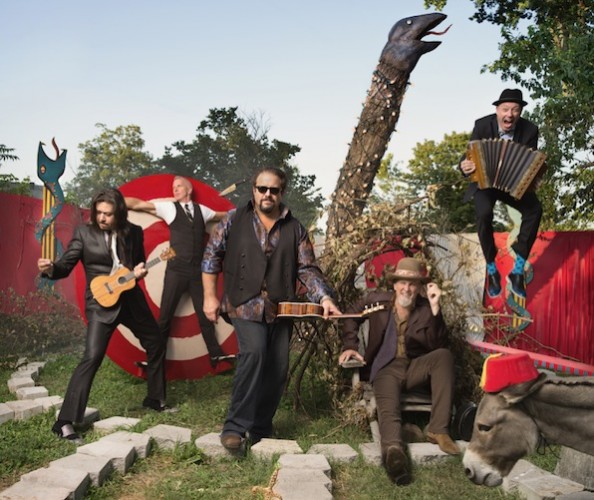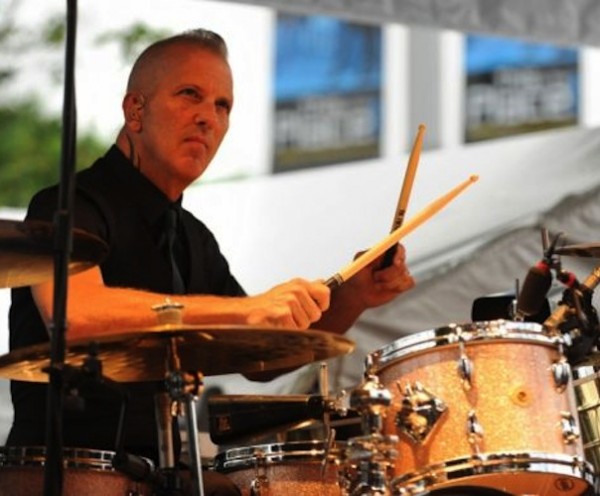Music Interview: Talking With the “Mavericks” Man
Mavericks drummer Paul Deakin on his band’s resurrection and 25th anniversary

Meet the Mavericks: (L-R:) Eddie Perez, Paul Deakin, Raul Malo, Robert Reynolds, Jerry Dale McFadden. Photo: Photog: Mark Tucker
By Noah Schaffer
In December 1989, a country band with a Cuban-American lead singer took the stage at a punk rock club in Miami’s Little Haiti neighborhood. “It was all wrong, and somehow it worked,” says Paul Deakin, co-founder and drummer of the Mavericks.
Along with lead singer Raul Malo, bassist Robert Reynolds and a cast of newer members, the Mavericks have somehow managed to maintain a large audience despite playing a meld of Tex-Mex, lounge jazz, and honky tonk which couldn’t be further away from the modern Nashville country-pop sound.
Two years ago they reunited after a 7-year hiatus. The result was a tour with an expanded lineup that featured a horn section and the LP In Time. Now they’re continuing their second incarnation with a 25th anniversary tour which comes to the Wilbur Theater in Boston on Sunday and Indian Ranch in Webster on August 9. (Their 2013 Indian Ranch show topped this critic’s year-end list.)
Recently, drummer Paul Deakin talked from his Nashville home about the Mavericks’ second coming and his off-stage life as a carpenter.
Arts Fuse: Is this reunion continuing indefinitely?
Paul Deakin: I think so – it’s looking like 20 dates may turn into 20 years. We’re going into the studio to make the next record and we’ll be moving on from there. The original idea was that a promoter gave us an offer for a summer tour and Raul thought it’d be disingenuous just to go out there and do the old songs – he had some songs and we ended up making a record, and here we are. We didn’t know if the brotherhood would be there or if the band would sound like it did – but it’s the very same band. I think the further you get away from something the more you’re able to appreciate it. It’ll have a lot more longevity. Hey, are we playing the same club we played last time in Boston?
AF: No, that was a club [the Royale], this is an old theater – but the seats are being removed from the area in front of the stage. Is that something the band requests?
Deakin: We like the option for both – obviously we like playing old theaters quite a bit. Just the sound and the vibe at historic theaters is great. But it’s ideal when you can have seats for people who want to sit and then a floor where people can dance.
AF: I understand you were working outside of the music industry as a carpenter before the Mavericks got back together.
Deakin: Yes, when we stopped in 2004 I had some offers to go out with other bands but my wife cut off my touring pass. We had young kids. We had saved up some money so wanting to do carpentry wasn’t so much a financial issue as a productivity issue. I’d always wanted to be carpenter. So I bought a lot of tools. People figured I could do the job because I had so many tools. If I was told I’d have to hang a door, I’d go online the night before and learn how to do it. I started at $15 an hour, worked my way to $30 and then started my own company called “Carpentry for all Occasions” – an inside joke [referencing the Mavericks’ Music for all Occasions album]. My partner had a Master of Theology from Harvard and I was a Grammy winner and we were carpenters. There’s something about musicians and carpentry. The guy that helped me get a job is Mike McAdam, the original guitarist in Steve Earle and the Dukes. It involves creativity and working with your hands.
AF: If a band like the Mavericks was starting out now would you be able to reach an audience?
Deakin: I’m sure we would not have been played on country radio. They don’t play us now. Radio is really shrinking. But there seem to be more outlets for bands to perform live and that seems to be where people are making their money. That feels good.
AF: Is it challenging being a drummer in a band which will veer from stone country to Latin to lounge jazz? Do you ever have to learn a whole new style of playing?
Deakin: On this record I had to do that. We have a song called “Dance in the Moonlight” – we call it a white boy cumbia. Raul said not to hit the kick on 1, and I was like…that’s weird. I’ve never done that. All of a sudden that beat was there for me.
AF: Instead of cutting out songs from your sets, your shows now run an epic length.
Deakin: And they’re getting longer. There’s no opening act. We’re doing at least 2 ½ hours — trying to give Bruce a run for his money. This tour is called “25 Live” – we really looked at it as a retrospective. Dec. 8 1989 was when we first played at Churchill’s Hideaway in Little Haiti, Mimai. We were just there filming a documentary about the venue which is closing. We were a country band with a Cuban-American lead singer playing in an English punk rock pub. It was all wrong but somehow it worked.
Over the past 15 years Noah Schaffer has written about otherwise unheralded musicians from the worlds of gospel, jazz, blues, Latin, African, reggae, Middle Eastern music, klezmer, polka and far beyond. He has won over ten awards from the New England Newspaper and Press Association.


Pauls drumming is so different and I enjoy watching him so much when he is on.
At 92 the Mavericks are my top show and I keep going back to it because you all are just soooo good
I’ve just discpvered the Mavericks & I’m enjoying them very much.
If I had a free wish I would wish I could play the drums like Paul Deakin. He is brilliant.